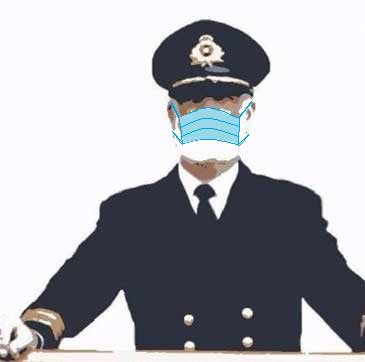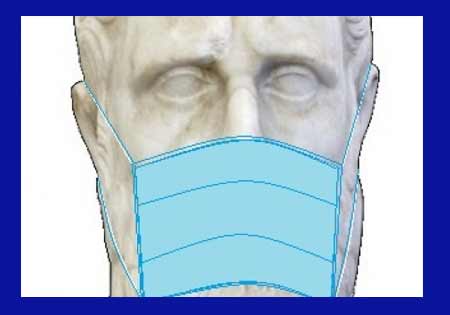Leadership at Sea during a pandemic- some tips from Stoicism
Zeno was a wealthy merchant who was born around 334 B.C. in Cyprus. On a voyage from Phoenicia (ancient Israel and Lebanon) to Piraeus, he survived a shipwreck where he lost most of his personal wealth. On reaching Athens, he visited a bookseller where he found Xenophon's book, the Memorabilia. Reading the book got Zeno to eventually start his own school of philosophy called Stoicism.

Bust of Zeno in a museum in Naples
Stoicism provides some guiding principles of life and is remarkably similar to philosophies practiced by other cultures worldwide. Some of these principles can help us make sense of life with all its ups and downs. Just like the sinking of Zeno’s ship would have caused him grief, the Covid-19 pandemic has challenged all of us, in some measure or the other. When governments shut borders to contain the spread of the pandemic, air traffic fell by over two-thirds. This means crew change cannot be carried out at planned intervals which could lead to fatigue. For others, inability to join ship has meant less earnings. Seafarers in certain segments such as cruise ships and car-carriers face uncertainty in employment as these ships are unlikely to resume business as earlier at least until the end of this year. This hasn’t been the first pandemic in human history, nor will be the last such crisis. Stoicism inspired strategies, also endorsed by astronauts and submariners, can help us make sense of the situation and help us lead under these circumstances.
We do need to acknowledge that it is not business as usual. At the same time, stoicism recognises the dichotomy of control, that is, that some things such as the pandemic and travel restrictions are not in our control, but other things such as our response to the crisis and our motivation is within our control, and that is where our focus should be. We do need to have a hard and honest look at our expectations and think about our response.
Stoicism offers us responses shaped by its values such as morality, wisdom, moderation and courage. Morality means one’s actions should contribute, in some small way, to benefiting humanity, or at least not do the opposite. Most seafarers already cooperated by extending their stay on board for several weeks past their end of contracts which was the right thing to do under these circumstances.
Extending the stay on board has not been easy; the demands of working at sea can create stress and fatigue. Prolonged stay away from the family adds to the stress. Simply going on working, while enduring discomfort is an act of courage.
Definitions of moderation include self-discipline, objectivity and a careful balance of behaviours. Wisdom involves the dissipation of negative thoughts through practical strategies which also help us build constructive thoughts and peacefulness irrespective of the circumstances.
Some of these strategies are:
Learn to make the best of things: Make the best of the situation. Look at the positives. If you’re on board, think of the additional salary that you’ll be earning. Reschedule your vacation to a later date. If you’re at home for an extended period, spend quality time with your family. See what other employment opportunities – not just in shipping, are out there. Update your knowledge and skills with online education.
Stay disciplined: Engage in a routine which may involve exercises, sports or yoga. A shower, fresh clothes and making your bed can give you a good start to your day. Exercise releases endorphin, a feel-good hormone.

Invest in yourself: Use this time to increase the range and depth of your knowledge which could help you professionally and personally. These days, you just need an internet connection to access online courses, podcasts, books and movies. Doing something different releases dopamine, another feel-good hormone.
Have a sense of purpose: Stoicism suggests that reason helps us stay positive and make sense of the situation which may have been imposed upon us. Reframe your quarantine stay or any restriction as being part of a worldwide effort to contain the virus and saving lives.
Stay connected: Stoicism says that we need to follow human nature, i.e. we can live on our own but we thrive in groups. Our socializing time is often called ‘happy hour’ because positive social interactions relive feelings of stress by boosting dopamine and endorphin levels.
Speak with your family and friends and cheer them up. At the same time, balance your phone home time with healthy interaction with your shipmates. Some of your colleagues may be having a tougher time than you in coping with the situation, and you could help them. Stay grounded so you’re not caught up with their anxieties. At times, you may be the one who needs help and advice. It’s OK for help. Reach out to your shipmates for a chat. Or, call any of the free seafarer-helplines. We all need a ‘safety-net’ and people we can talk freely to.
Ignore the ignorance: Ignorance is the opposite of wisdom. Understand the actual risk, don't just be afraid of things. Reach out to a credible source and find out what is truly the situation regarding the virus or travel restrictions.
Discuss the Covid-19 response plan with your colleagues and measures to ensure health and safety on board. Ensure that everyone on board and all visitors follow safety and hygiene protocols, including when on travel to and from the ship.
Communicate, communicate, communicate: This applies to leadership in all situations but under the circumstances, it is more important than before. ‘Galley talk’ can create panic and lower morale. Instead communicate as often as possible with your team on board and on shore. Pass on information both ways.
Update your crew with the relief situation regularly, even if it is bad news. Similarly, keep your crewing manager informed of the sentiments on board. It is better to be up front, rather than have your team be surprised and react badly.
Don’t get surprised if you are asked to get on a video or audio call with your office every now and then. People are concerned, both about the ship and your welfare. Participate to your fullest.
Embracing the ‘new normal’: Changes you will have observed, and can expect in the future include:
From handshakes to disinfection protocols, our social interactions have changed- possibly for the foreseeable future. It may be awkward at first but it is the best way of being polite and showing respect for your own and the other person’s well-being.
Local regulations are changing everyday due to developments in the spread of the virus. This means the ship will need to get even more involved in local operations such as in coordinating the crew change. The ship may often have to the focal point in communications with the crewing and the operations departments and the local agents.
Superintendents may not be able to travel to the ship to assist with dockings and repairs. Companies may appoint third-party contractors to fill that role but as we know, it’s not the same. Senior Officers will need to assume additional responsibilities of budgeting, prioritization, management and coordination in such situations.
Technicians and Class surveyors may be unable to travel to assist with repairs or to attend to surveys. New technology such as online cameras will be increasingly used both for surveys and to guide the crew on performing complicated repairs.
Due to a lack of flights, logistics have become difficult and expensive. For ship’s officers, this means planning well in advance for stocking stores, spares and provisions, and more inventory to be maintained on board.
Due to an accumulation of overdue reliefs, and the possibility of continuing travel restrictions, there may be a possibility that the usual spacing between reliefs, such as between Master and Chief Officer may not be possible. Ensure you have a detailed familiarization and Bridge Team meeting soon after joining so you can get the team focused and aware from an early stage.
Be prepared for emergencies: As the pandemic is a relatively new occurrence, we don’t yet have all the emergency response mechanisms in place or that they are mature enough. More now than ever, the response will require creative thinking, teamwork and close communication both within the ship and with the shore teams. Prepare for scenarios such as having a suspected infection on board or a medical emergency for which shore assistance is not available.
Leadership under the extraordinary circumstances of the pandemic needs to be flexible. Leaders on board must have the wisdom, morality, moderation and courage to adapt to the changing needs of the organization and their colleagues. And I do wish you a noble spirit; as Seneca, another Stoic philosopher, says ‘what we can do is adopt a noble spirit, such a spirit as befits a good person, so that we may bear up bravely under all that fortune sends us and bring our wills into tune with nature’s'.
Stay safe out there!

Link to the article on Lighthouse Chronicles


